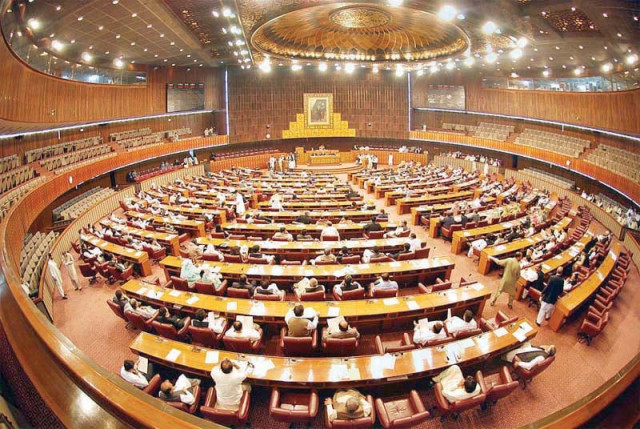Religious objection raised on Waqf properties bill
NA committee chief says laws guided by Shariah cannot be altered to suit FATF demands

Religious objection raised on Waqf properties bill
NA committee chief says laws guided by Shariah cannot be altered to suit FATF demands
RIZWAN GHALZAI
ISLAMABAD
The National Assembly Standing Committee on Religious Affairs and Interfaith Harmony on Wednesday took suo motu notice of the recently approved Islamabad Capital Territory Waqf Properties Bill, 2020 and sought briefing from the Ministry of Religious Affairs and Interfaith Harmony.
The committee, chaired by Asad Mahmood, expressed its reservations regarding the bill on religious grounds, declaring that some sections of the approved bill did not conform to the injunctions of the Holy Quran and Sunnah.
The bill had been approved to help take the country off global money-laundering and terrorism financing watchdog Financial Action Task Force’s (FATF) grey list and aimed at proper management, supervision, and administration of Waqf properties in the territorial limits of ICT.
Questioning the religious standing of the bill, Asad Mahmood said that the laws guided by Shariah cannot be altered merely to suit FATF, adding that whenever someone declares his or her property as trust, the property comes directly under the ownership of Allah. “Therefore, no deputy commissioner or any other officer is authorised to change the ownership of that property.”
Read more: Pakistan, Hungary warn of FATF’s political use
The Standing Committee recalled that both the country’s founding father Quaid-e-Azam Muhammad Ali Jinnah and poet-thinker Allama Muhammad Iqbal advocated for the protection of rights of Muslims and the trust properties during the British colonial rule, adding even the Trust Act 1860 protects the rights of Muslims.
It was suggested that the recent changes made to the law need to be looked into once again under guidance of the Council of Islamic Ideology (CII).
“We want to make it [the bill] transparent. In this regard, a letter will be written to the Interior Ministry to provide the committee with a draft of the Waqf Property Bill,” Mahmood informed the panel.
Asad Mahmood said that because the bill was part of the three FATF-related laws -- the Islamabad Capital Territory Waqf Properties Bill, 2020; the Anti-Money Laundering (Second Amendment) Bill, 2020; and the Anti-Terrorism (Third Amendment) Bill 2020 – they were allowed little or no time to share their opinion on the matter.
The committee was then informed that Ministry of Religious Affairs and Interfaith Harmony has completed the arrangements for Hajj, 2021.
However, they did not receive any information from Saudi Arabia. Therefore, any comment in this regard, would be premature.
The committee was informed that recommendations have been finalized for Ministry of Religious Affairs and Interfaith Harmony to establish a recycling plant to protect the sanctity of the Holy Pages, but nothing could be done so far.
The committee unanimously decided to establish the recycling plant and directed the Ministry of Religious Affairs and Inter-Faith Harmony and the Pak-PWD to fulfill their responsibilities in this regard.
The Committee directed to complete the PC-II and PC-I of the recycling plant and submit it by the first week of July, besides allocating the cost of the project in the ensuing budget for the fiscal year 2021-22. The Committee was apprised that the Saudi government did not communicate about the allocation of Hajj Quota yet.



















COMMENTS
Comments are moderated and generally will be posted if they are on-topic and not abusive.
For more information, please see our Comments FAQ